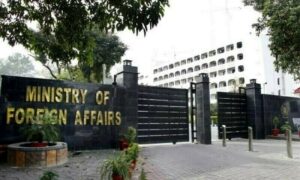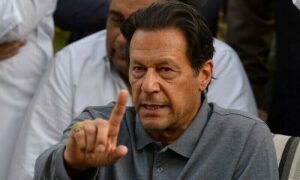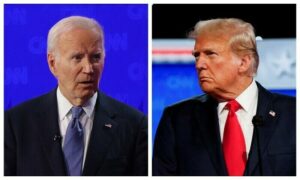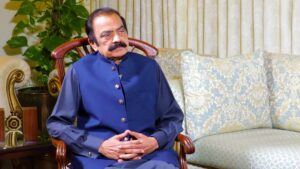IT may be the season to be jolly in some parts of the world, but here, at home, it’s the time for some ‘talking-shalking’.
The PTI was the first to celebrate this season of joy and peace when it expressed its willingness to talk to other parties and even announced the names of members of a negotiation team. Though this didn’t stop Imran Khan from blowing hot and cold, the rest of his party appears quite keen on the idea of a rapprochement. So much so that Khan has had to tell them off for being too soft on the government, especially in the wake of the shooting of party workers during the Nov 26 dharna. In fact, just recently he expressed his disapproval of Ali Amin Gandapur’s warm welcome to Mohsin Naqvi during the latter’s visit to Peshawar. But even Khan’s wrath hasn’t stopped his men from showing their eagerness to talk.
On the other hand, the government’s second tier — no one has access to ask what the first tier, the Sharif family, is thinking — is behaving more like Khan and less like their counterparts in the PTI. Most of those on the treasury benches are busy behaving like an enraged Hulk, and still using their favourite adjectives for the PTI, though there have been a few senior ones who are punctuating the name-calling with words about a ceasefire. For instance, some people such as Rana Sanaullah, have conceded the need for gup-shup, even if others continue to talk about May 9 and conspiracy.
Before we knew it, the government also announced a committee, which appears more like a kitty party, as everyone from every party in parliament has been added to it, including people like Aleem Khan, who don’t even have a party as such. But the decision to do so is also a message in itself. It means the dialogue is not to be between the PTI and PML-N but between the larger coalition in power and the PTI. It is like the entire extended family being taken to approve the girl whom the boy is already not in favour of — how much further can the rishta party upset the proverbial trolley party at this point?
Chances are that, with so many stakeholders, it is going to be hard to decide on a minimal agenda, especially as many of them are in government only because the PTI is not.
The real decision-making in Pakistan takes place behind closed doors; always has and always will.
Otherwise, too, there is little indication about the government’s willingness (or lack thereof) to engage with the PTI’s conditions — a judicial commission to look into May 9 and Nov 26, and the release of prisoners. Nor do we know what the agenda on the government side is, though the messengers of the powers that be keep announcing that the PTI’s social media needs to be politer and respectful.
The absence of common ground is perhaps what the problem is. Indeed, it is not difficult to see why the PTI should enter into talks — if there is serious engagement from the other side, it can gain much, such as the election cases or relief for its prisoners. However, it is hard to see what use the exercise is for the government. Though it is asserted all the time that it suits the government to have a less restive opposition, this truism is about as accurate as Jane Austen’s universally acknowledged truth about a rich single man being in need of a wife. Indeed, this government is sitting pretty as long as the PTI continues to be agitational, irking the military establishment — the higher the tensions between the establishment and the PTI, the more comfortable the government can be.
So, what can the talks really deliver? Especially when it seems there is some support for this idea from the establishment. Consider a recent talk show where a defence analyst (who wasn’t just a retired brigadier but a retired general) said that if the establishment were against the idea of the talks, ‘woh establish hee na hoti’. It was an insightful comment and does compel one to think the talks have the blessings of the establishment.
However, one needs little circumstantial evidence of it via retired men, for this government wouldn’t have even bothered forming a committee if the idea wasn’t welcomed in some quarters. And with many of the government’s senior faces, who, like some journalists, are better known for being messenger boys than having a serious take on the matter, it will indicate something as well.
But while these talks will fill the airwaves and provide breaking news for many channels, how they will progress remains unclear.
The reason for this scepticism is that, in Pakistan, ‘real’ talks hardly ever take place in the full glare of publicity. Consider the famous talks that took place between the PPP and Tahirul Qadri when he came to Islamabad one cold winter, while the former was inhabiting Constitution Avenue. Carried out in front of the cameras, they never really yielded any results. Or the talks between the PTI government and the opposition over FATF laws. They too failed.
The real decision-making in this country takes place behind closed doors; it always has and always will. Take the ‘London plan’, be it the one where Imran Khan plotted with Qadri, or the second one, which PTI claims is where the PML-N came to some agreement in order to attain power. Or even consider the PDM — its earlier meeting in a hotel in Islamabad, which led to a series of jalsas, fizzled out without really weakening the PTI government. But then, without any notice or any negotiations, Asif Ali Zardari and Bilawal Bhutto-Zardari met Shehbaz Sharif and Maryam Nawaz for a meal and the earlier bad blood became a thing of the past. And before we knew it, the PTI government had been sent packing.
That is how negotiations really happen. Don’t expect too much from these present committees and the expected round of talks. It is like expecting Salman Khan to start acting in his next film.
The writer is a journalist.
Published in Dawn, December 24th, 2024







